History and mythology collide in Total War Saga: Troy
Prepare for an infantry-heavy assault on the great fortress of Troy.
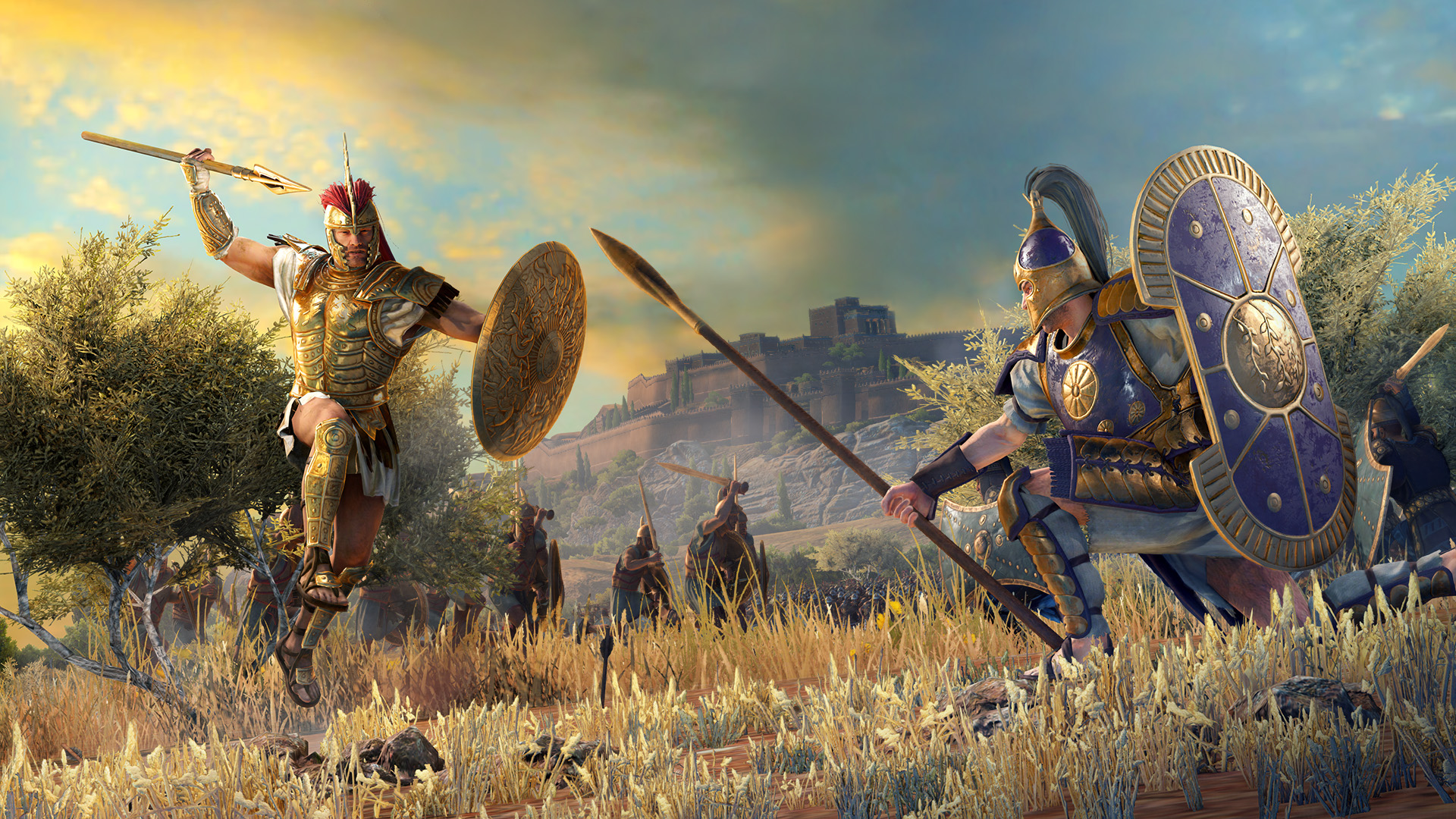
Total War is delving into mythology. For the last couple of historical games, myths and legends have been creeping into the war-torn sandbox, but in Total War Saga: Troy, Creative Assembly Sofia is taking things one step further, honing in on a conflict where our best source is an epic poem about petty gods and a giant wooden horse. This isn't Warhammer, though, and history hasn't been entirely abandoned.
So there are gods. And mythical heroes. And even a minotaur. The team's drawn on ancient yarns like The Iliad and The Odyssey, along with other myths, but then squinted at them through the lens of history. Maps and archeology have been used to give cities and armies an air of authenticity, and the minotaur is really a big bloke wearing a bull's head and wielding a massive axe. When he's charging at an army, though, the distinction doesn't matter too much.
"We've got the history and archaeology on the one hand, and we have the characters and the narrative from The Iliad to just pour over them," says lead game designer Todor Nikolov. Troy reinterprets a slew of far-fetched legends, but it's grounded by the historical layer. The familiar Total War campaign structure has been similarly preserved.
Just like The Iliad, Paris will kidnap Helen, the Spartan queen, and flee back to Troy, but from there little is etched in stone. Things might play out like the poem, and the eight playable factions favour certain paths and have established relationships with other factions, but this is still a sandbox. Instead of Greeks uniting, hopping on their boats and besieging Troy, they might just fight among themselves over territory back home. Playing as one of the Trojan factions, you could stop them before they even reach the formidable city, then take the war west. If you don't mind being labelled a traitor, you can switch sides, even if you're playing as Hector, the Trojan prince. He's meant to protect his father's city, which he can also inherit, but you could decide that he deserves to be a king a little earlier.
The factions will start small and need to use diplomacy, trade and conquest to expand. Playing as Meneleus of Sparta, you won't just be able to gather all of your buddies and sail off to Troy right away. You'll need to wine and dine the other Greek factions and try to form a confederation, or batter them into submission, before heading east with a massive alliance. And you'll be wanting to bring plenty of heroes with you, as well as an elite army, so that means you'll need to spend time building and planning. You could try to rush off and do it all alone, of course, but Troy is a tough nut to crack. It's essentially Total War's version of a boss battle.
Troy soldiers
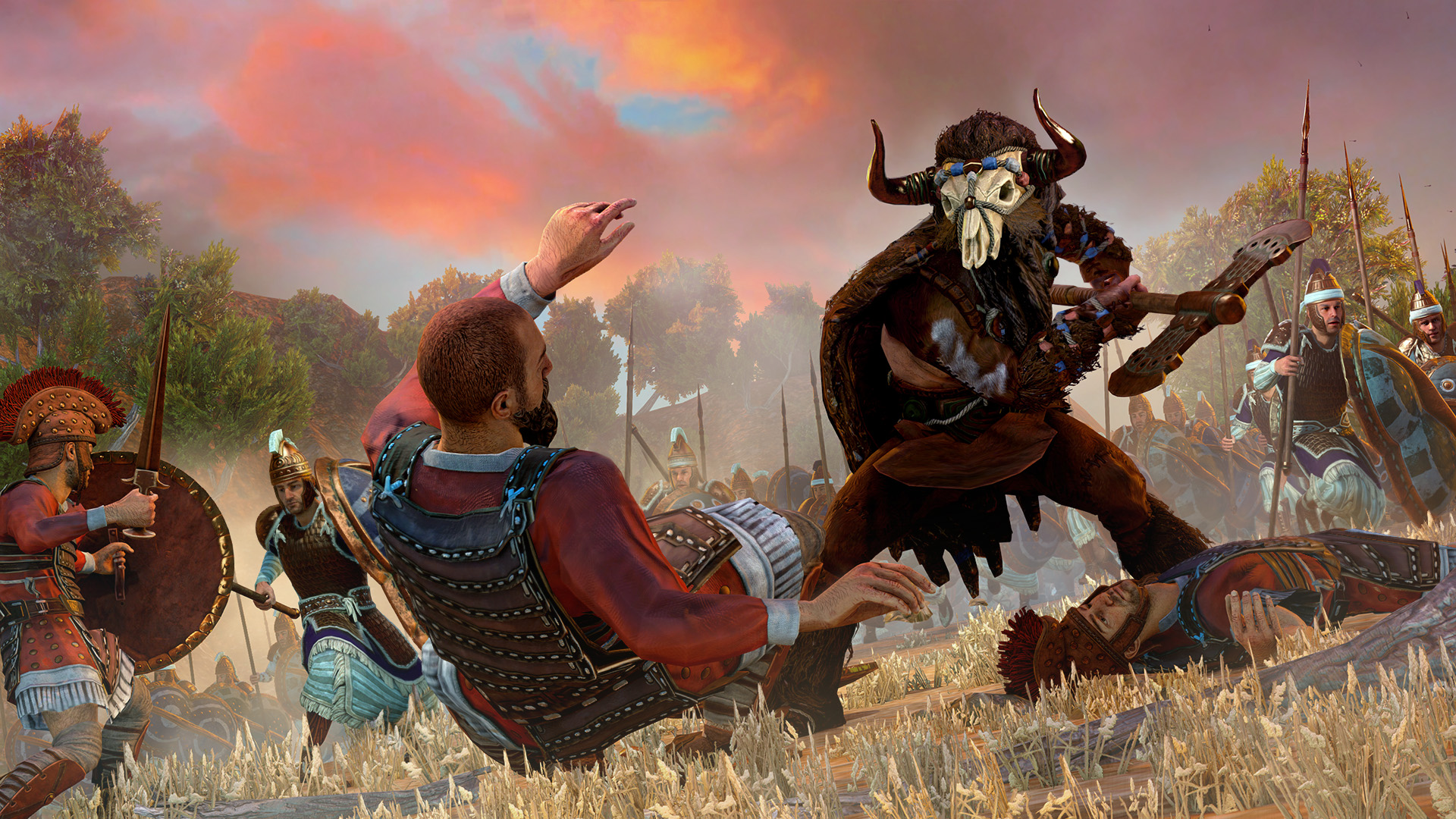
"Troy is always this massive, well-defended city," says Nikolov. "You could compare it to Kyoto in Shogun 2. It's a faction of its own and held by Priam, the other king. They've got all the forces they need to hold the city for as long as possible, so it takes a considerable amount of effort to conquer it. I can't imagine that it will be possible to actually take the city near the early part of the game. You need a considerable amount of preparation, forces and, preferably, allies to be able to pull that off."
Or you could use a Trojan horse. Unfortunately, you won't be bundling warriors into the belly of a wooden equine, but there will be events and features inspired by it. Some historians have suggested that the Trojan horse is an allegory for earthquakes, which may have been the real reason the city fell. Poseidon, the god of big waves and big quakes, was also the god of horses, so the wooden horse could represent his wrath. These earthquakes will be present in the game and plague the city, softening it up for attack.
Keep up to date with the most important stories and the best deals, as picked by the PC Gamer team.
"Troy is left in a shambles, buildings are damaged and the garrison is severely depleted," says Nikolov. "If you fight on the battle map for Troy during that period of time, you are going to see wall breaches, which are otherwise not achievable, and general destruction everywhere. They are windows of opportunity that you can use if you want to take the city, so you'll need to pay special attention to them."
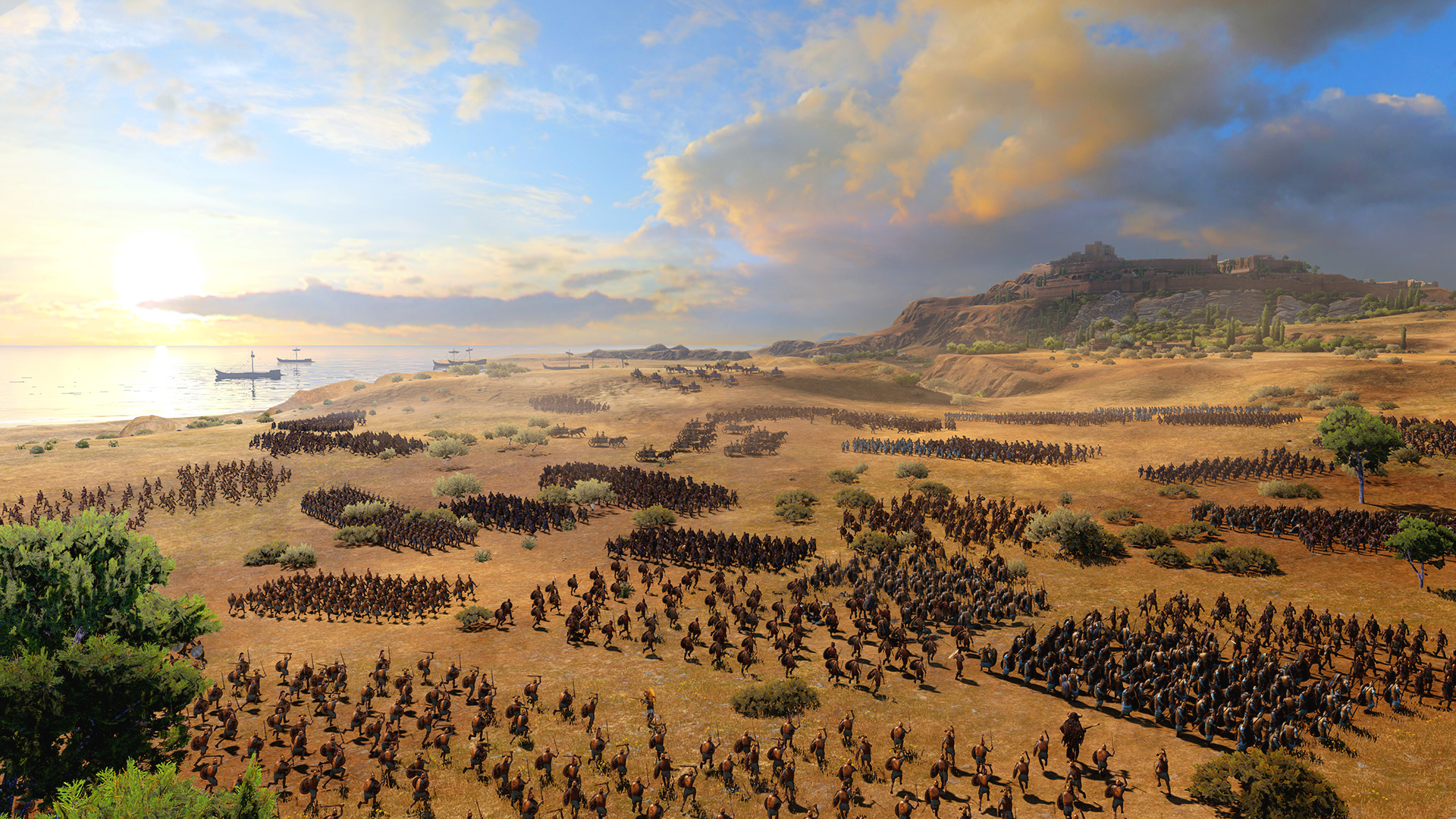
Actual horses won't feature that much in Troy. The Bronze Age Trojans and Greeks used horses in war, but largely for transport or as status symbols. Some warriors will get to ride around in chariots, but cavalry is rare. By conquering a specific region that was said to host centaurs, however, players can recruit the legendary creatures, though they're really just regular horsemen, effectively light cavalry, who can be used to pester your enemies before quickly running away. Don't expect epic horse charges that send units flying.
Nikolov says this was one of the biggest challenges the team faced, but one they recognised right at the start when they started exploring the Bronze Age setting. With the absence of horsemen, more attention has been given to infantry units. There's the introduction of new flanking abilities, the ability to switch weapon stances and new terrain types, complete with obstacles. In a demo battle, I watch as one unit gets bogged down in some mud, while another sticks their shields on their backs so they can do more damage with their spears.
Fame game
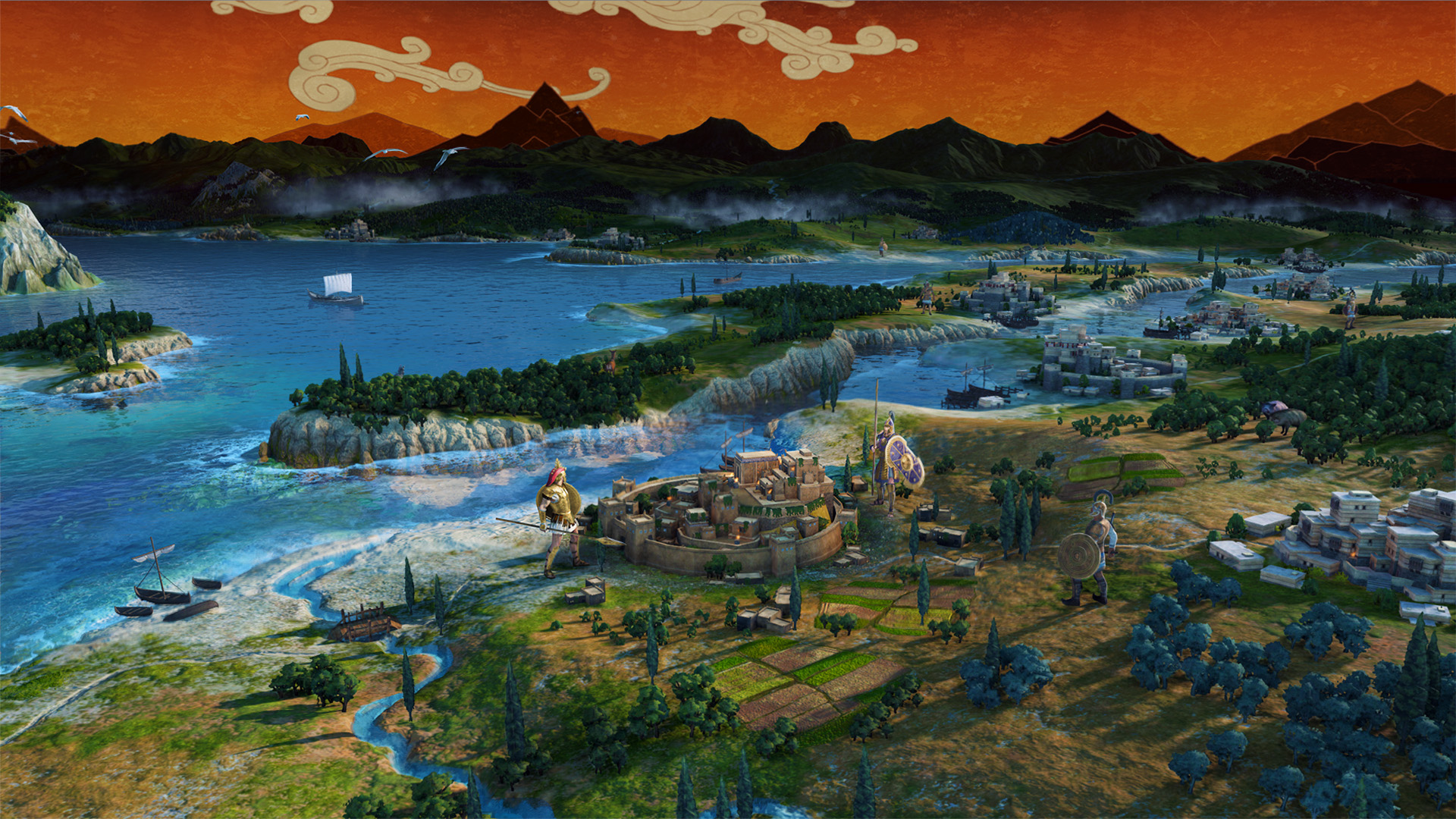
Heroes are Troy's heavy hitters. Achilles, Agammemnon, Hector, they're all leaders with flashy abilities and even flashier armour. They're showboaters, too, trying to work their way up the heroic rankings. Some of them, like Achilles, take it extra seriously, and he'll start sulking if other heroes are more impressive than him. They like to show off in the middle of battles, challenging each other to fights. Unlike Three Kingdom's duels, these challenges lock down enemies for a specific time, after which they can leave the duel with no penalties. And the ability needs to be unlocked first. The heroes are tough enough to take on whole units without breaking a sweat, potentially with some sort of divine artefact won by completing an epic quest and fulfilling their heroic destiny.
"They're quite like the quest chains in Warhammer," says Nikolov. "Basically, there are a series of objectives, which culminates in an epic battle. And it's a great tool for us to do some narrative in an otherwise sandbox game. With Odysseus, for example, his quest is actually our modest way to retell The Odyssey."
Unlike heroes, the gods won’t be wandering around the map or flinging spears at their enemies
If you're commanding the star of The Odyssey, then, you'll get a quest to go off and fight in Troy, then you'll be recalled all the way home to fight off your wife's suitors and show off your sick archery skills. There might be disguises. If you complete the quest chain and reclaim his kingdom, Odysseus will be able to wield a magical bow in battle, and he'll also be accompanied by his son, who serves as a new hero. Typical royals, always with the nepotism.
Unlike heroes, the gods won't be wandering around the map or flinging spears at their enemies, but they play just as significant a role, each representing a different major pillar of the game.
"We must represent the gods because they're essential to the narrative," says Nikolov. "You can't tell the story of the Trojan War without making reference to the gods. There are several movies about the Trojan War, and very few of those ever mention the gods, usually trying to make the story as grounded as possible, but The Iliad is not like that. We've chosen to implement the gods as part of the gameplay system where, based on what you do in the game, different gods tend to like you or dislike you, gaining or losing you favour."
Factions need to suck up to seven gods in the hopes that they'll bring them wealth or skill in battle. Build temples to Ares and slaughter captives after a battle and you'll put a smile on the god of war's face, netting your warriors the reward of being much better at killing. If you need another king to accept a crappy deal or cheer up a gloomy city, however, you're better off making Aphrodite happy.
Playing favourites
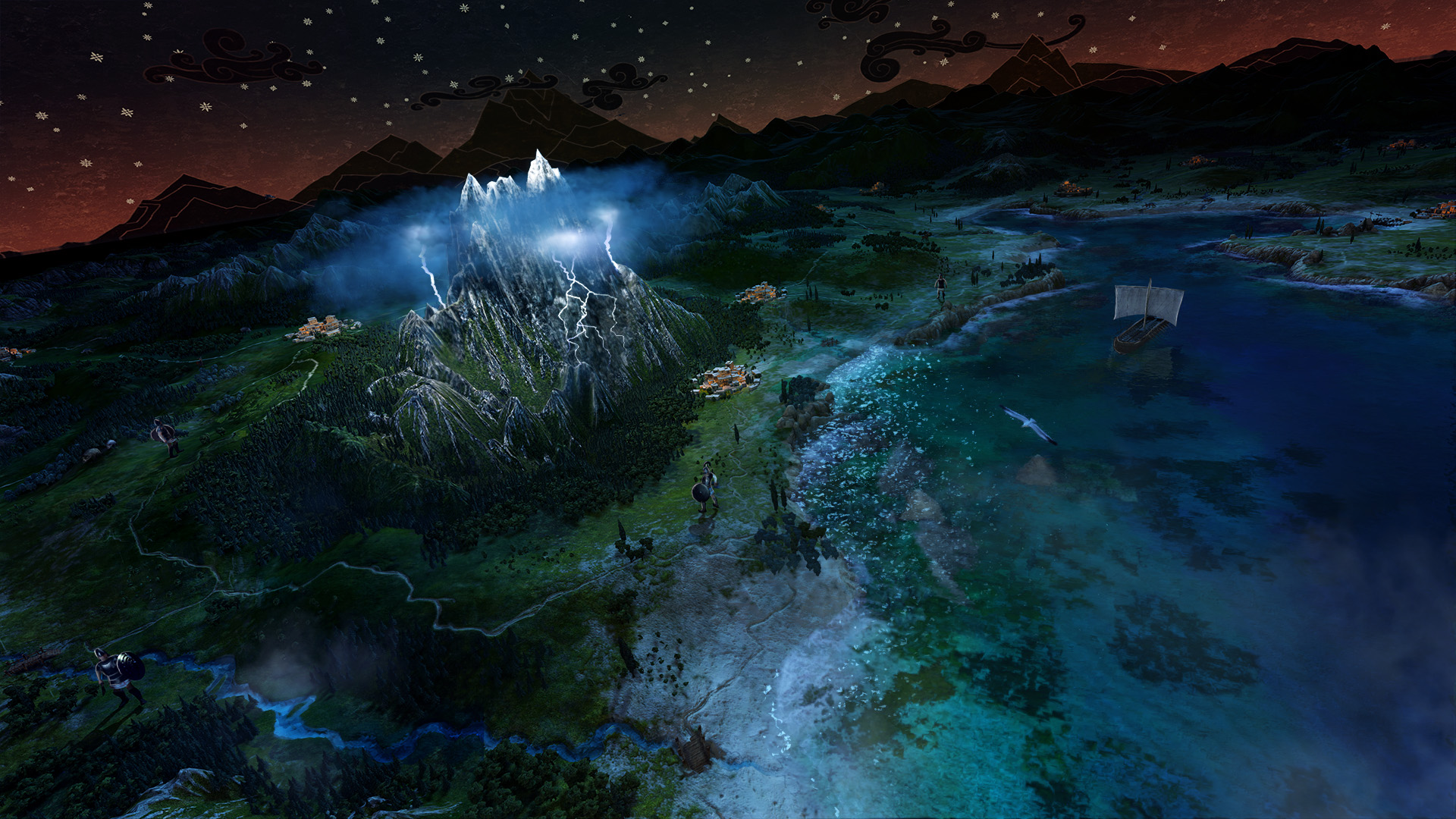
The gods are fickle, though, so you can lose favour or even wreck another faction's relationship with their god. One of the ways you can meddle with a faction's favour is by sending in a priest to perform a ritual in the opposition's territory. They're one of three returning agents, which Troy is unexpectedly bringing back.
These characters can perform various actions on the campaign map, like slowing down enemies or spying on cities, but they don't appear in battle.
In Warhammer, they were replaced by multi-purpose heroes, while Thrones of Britannia and Three Kingdoms gave their jobs to leaders. Cutting them out has done wonders for the pace of the game, so I'm uncertain if their return will be a welcome one.
Along with conventional agents like the priest, envoy and spy, you'll be able to recruit epic, one-shot agents. They don't level up or get skill trees, but they also can't fail an action. Once they're used, however, they're gone for good.
They're total game-changers, says Nikolov, but I can already see myself trying to save them up for when I really, really need them, which means I'll definitely never end up using them at all...
There does, generally, seem to be more micro-management. There's no currency in Troy, but factions will need a big stash of other resources to keep things running. Food is used for lots of things, including the upkeep of troops, while more advanced units will need bronze for their gear. Wood and eventually stone, meanwhile, are required for constructing and maintaining buildings. Gold is the rarest resource, but it's prized by everyone and is heavily involved in trading. And if you run out of these resources, there will be penalties, from deserting troops to buildings falling down.
Going for broke
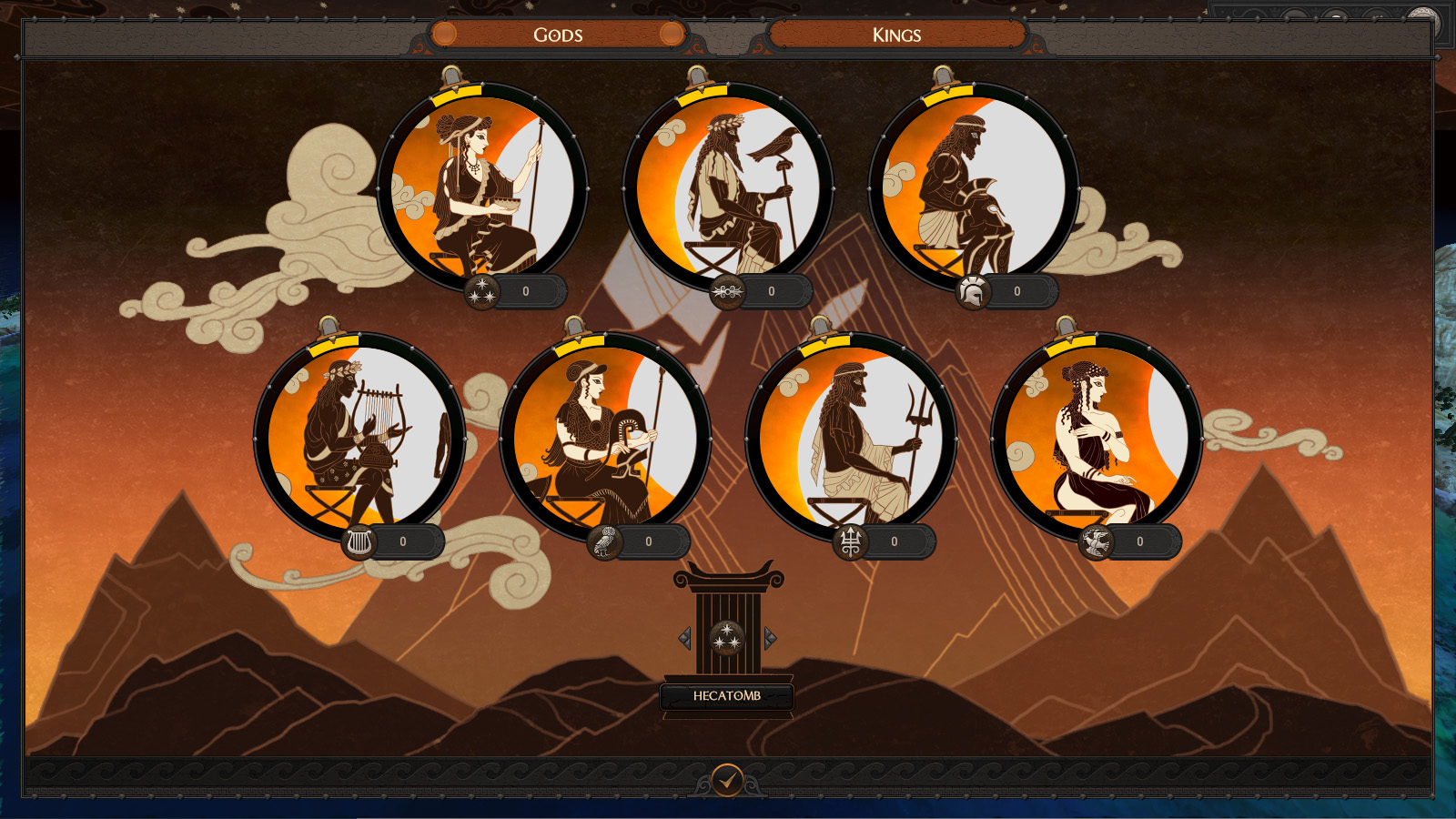
"It basically means that you can go bankrupt in more than one way," says Nikolov. "You need to keep all these things in mind. Sometimes you might even be fine to just endure several turns of food bankruptcy, because a certain situation demands it, but it's a lot more to take care of, and the whole economic gameplay on the campaign map is going to be a bit more complex."
Troy introduces more types of specialised minor settlements that you'll want to conquer and upgrade to fill your stores, and you'll need to be quick about it. Some resources can be depleted, so you have to be the first to exploit the resource to get every last drop. The competition over minor settlements is probably going to be pretty fierce in the early game, but there are also some other ways to meet your war machine's production needs, including trading with other factions, trading with ships that have come from more distant lands and good old fashioned raiding.
The campaign map itself is definitely in the running for Total War's most striking warzone. It's around the size of Rome 2, though the scale is smaller, dominated by the Aegean Sea in its centre. Despite the prevalence of the sea, ship combat doesn't really fit with the setting—and has never been great—so you won't be duking it out on boats. The colours are more vivid, the ocean is brighter and it generally has the look of a fantasy map, especially when you hover over imposing Mount Olympus. Even the skybox is a treat, with illustrations of clouds and mountains designed to look like classical Greek pottery.
Total War Sagas focus on historical flashpoints, but they also seem like a good place for Creative Assembly to experiment and try out new ideas. Getting rid of cavalry is a pretty bold move, and one I don't think we'd see outside of these spin-offs. So, while the Trojan War isn't really historical, it's the source of some intriguing tweaks to the Total War formula and great fodder for a game that's about truly epic battle.

Fraser is the UK online editor and has actually met The Internet in person. With over a decade of experience, he's been around the block a few times, serving as a freelancer, news editor and prolific reviewer. Strategy games have been a 30-year-long obsession, from tiny RTSs to sprawling political sims, and he never turns down the chance to rave about Total War or Crusader Kings. He's also been known to set up shop in the latest MMO and likes to wind down with an endlessly deep, systemic RPG. These days, when he's not editing, he can usually be found writing features that are 1,000 words too long or talking about his dog.

